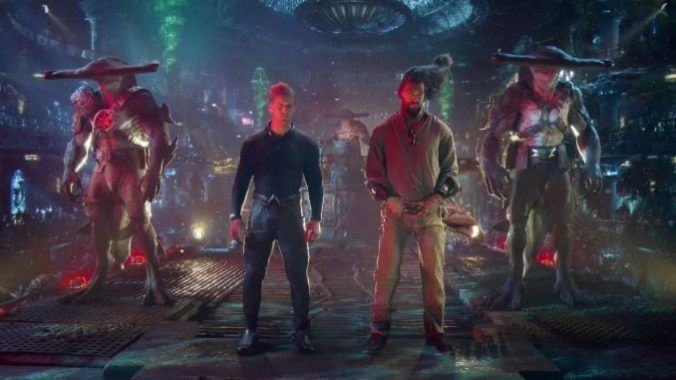Aquaman Sends the DCEU Off to the Lost Kingdom in the Sky

And so, the DC Comics movie universe, accidentally and then later officially shorthanded as the DCEU, ends in 2023 much as it began 10 years ago: With great clamor, and little indication of some grander connection to a vast web of intersuperhero continuity. Even the style of clamor present in Aquaman and the Lost Kingdom is a world away from the emo-bombast of Zack Snyder’s Man of Steel, the big-yet-not-big-enough hit that kicked off this decade-long experiment back in 2013, and inspired the first of countless DC pivots that eventually (along with general corporate insecurity) allowed the whole thing to collapse in a heap. Aquaman and the Lost Kingdom, emboldened by the genuine success of its predecessor, clamors on its own terms, and collapses in its own heap.
This feels true even when Aquaman and the Lost Kingdom displays evidence of a drawn-out production – which it does almost as soon as it begins, when Arthur Curry (Jason Momoa), also known as the Aquaman, launches into narration meant to catch us up on his life since the first film, which ended with him becoming king of the secret underwater society of Atlantis. Director James Wan splices together Arthur taking on a band of pirates on a boat, fighting creatures in an underwater arena and, principally, taking care of his infant son Arthur Junior in a way that suggests those first two things were perhaps once major setpieces that didn’t come together in this streamlined final cut. Mining them for montage material creates some fun juxtapositions; sometimes big-budget special effects are more fun when they don’t carry the weight of 10-minute obligations. But while this is an early sign that the Aquaman sequel will maintain the gleeful, fantastical muchness of its predecessor, it’s also a warning that this movie will be so busy, even inconsequential cutaways will involve marshaling vast CG resources. It’s one of those superhero movies where no one seems to fully inhabit a recognizably human body.
That’s what the Aquaman sub-series is for, though: a chance for DC’s godlike characters to go full-on Clash of the Titans, replete with a full cast of gods and monsters before even mentioning the various other Justice League members, all absent here as before. Arthur, already struggling to balance the dull duties of governance with the ragged joys of child-rearing (and it is sweet to see big, goofy Jason Momoa show sincere investment in getting his son down to sleep), is further bedeviled by accelerated climate change, which can be traced back to his old nemesis Black Manta (Yahya Abdul-Mateen II). Manta – a human, not an underwater-dwelling Atlantean – has discovered an ancient superfuel that further wrecks the environment, as well as a dark-magic trident. Put together, these MacGuffins should give him the power he needs to get revenge on Aquaman. Arthur must find him and stop him, insisting that his half-brother Orm (Patrick Wilson), the imprisoned villain of the previous film, is the only Atlantean who can help with this task.
This is how the movie eventually settles into a kingdom-hopping buddy adventure with Arthur and Orm bickering over best practices for underwater heroics. Before they even get to the titular lost kingdom, they’re zipping through a hidden jungle, eluding giant grasshoppers; starting trouble in the Sunken Citadel, an underwater Mos Eisley with its own celebrity-voiced Jabba the Hutt figure; and squaring off repeatedly with Black Manta who, as before, tends to enter and exit scenes via explosion. Fans of the Star Wars prequels or the Avatar pictures should continue to delight at this bounty of monsters, lasers and watercrafts, however cheesier Wan’s showmanship is than that of vintage Lucas or Cameron.
-

-

-

-

-

-

-

-

-

-

-

-

-

-

-

-

-

-

-

-

-

-

-

-

-

-

-

-

-

-

-

-

-

-

-

-

-

-

-

-








































